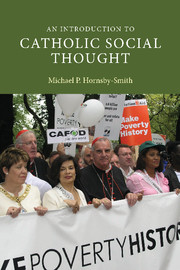Book contents
- Frontmatter
- Contents
- List of tables and figure
- Acknowledgements
- Dedication
- List of abbreviations and acronyms
- PART I SOCIAL REALITY AND SOCIAL ANALYSIS
- PART II THEOLOGICAL RESOURCES
- PART III JUSTICE ISSUES
- 6 Human rights
- 7 The family
- 8 Economic life
- 9 Social exclusion
- 10 Authentic development
- 11 War and peace
- PART IV ACTION RESPONSES
- Appendix: Selected campaigning organizations
- References
- Index
11 - War and peace
Published online by Cambridge University Press: 14 January 2010
- Frontmatter
- Contents
- List of tables and figure
- Acknowledgements
- Dedication
- List of abbreviations and acronyms
- PART I SOCIAL REALITY AND SOCIAL ANALYSIS
- PART II THEOLOGICAL RESOURCES
- PART III JUSTICE ISSUES
- 6 Human rights
- 7 The family
- 8 Economic life
- 9 Social exclusion
- 10 Authentic development
- 11 War and peace
- PART IV ACTION RESPONSES
- Appendix: Selected campaigning organizations
- References
- Index
Summary
THE UBIQUITY OF CONFLICT
The sixth area of concern is that of war and peace and the related issues of defence strategies, the arms trade and terrorism. Since the Second World War there have been numerous major conflicts, in spite of the efforts of the UN. For four decades there was a dangerous period of nuclear deterrence between the two major superpowers and their associated blocs. Yet the euphoria which attended the collapse of Soviet Communism has not meant the end of war. Recent terrorist atrocities appear to have been provoked by a sense of grievance against the western world's power, arrogance and indifference to the plight of billions of poor people in the developing world.
Auschwitz-Birkenau is a permanent reminder of the attempt by Nazi racists only one lifetime ago to exterminate a whole ethnic group. The conflicts in Northern Ireland, the Balkans, Rwanda and the Holy Land also have their roots in deep ethnic antagonisms and injustices. Other conflicts, such as the two Iraq wars, were related more ambiguously to economic and political interests. Millions of people have been killed or injured in such conflicts since the Second World War. Many more have fled from such conflicts and are to be found in refugee camps all over the world, overwhelmingly in poor countries.
Eric Hobsbawn, has suggested that the twentieth century was the most murderous in recorded history with 187 million deaths, the equivalent of 10 per cent of the world's population in 1913.
- Type
- Chapter
- Information
- An Introduction to Catholic Social Thought , pp. 282 - 318Publisher: Cambridge University PressPrint publication year: 2006

